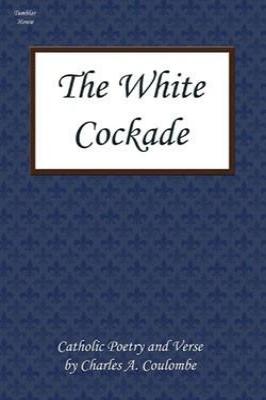
The White Cockade
Delivery in 2-9 business days.

There are many wonderful books in the world that address and teach how a good Catholic should think. However, it is important that a person not only think like a Catholic, but feel like a Catholic. Mr. Coulombe's poems convey the feelings that millennial Catholics regularly have: feelings of angst regarding the future, but also that of hope; feelings of righteousness and feelings of awe over the majesty and wonders of Catholic tradition. The White Cockade is filled with bite-sized poems that will inspire you and touch you on an emotional level.
Poetry is a young man’s game. That is not to say that older people (and women) can’t write fine poetry. They can and do. But there is something about a man’s youth --- his late teens and early twenties that lends itself to poetry. As my friend Richard Cowden-Guido puts it, “It is easy to be interesting when you are young; you’ll spend the rest of your life struggling against being a bore!” It is obvious that most of us are not equal to the struggle. Dr. Johnson preferred the sins of youth to those of age, because they are not coupled with sanctimony.
It is not merely that one is physically stronger or more attractive in one’s youth than he will likely become; it is that everything is new --- romance, politics, even war. The blush is not yet off the apple. Ideas are important, as are art, conversation, wine and moonlight. Who has not had an all-night bull session in college, at the end of which the world’s problems are solved? When you are young you believe that, given the right chance, you can conquer the world!
And what a world it is --- filled with joy and horror, with wrongs to be righted and avenged, with glorious causes to be fought for! “To be young was very Heaven!” Shelley said of the age of Revolution in the 18th century, and so, in some aspects, it always is for the young. Their ardor and passion can lead them on the High Crusade --- or into the Red Guards.
But the flip side is one of fear and doubt. What is my place in the world? Will I ever find it? Will I grow old without success? Will my life be a waste? Does she really love me? Is she the one? Will I ever find love? --- and on and on. Middle Age may be duller and less fiery, but generally, for good or ill, those questions have been answered.
So it is that the poems in The White Cockade were all written in my youth; some when I was a cadet at New Mexico Military Institute, others when I was struggling as a comic in Hollywood, still others when I was a novice writer looking for my voice. In earlier days, the great shadow was the Mordor-like Soviet Union; in the later poems, the joy and anticipation launched by the fall of that “Evil Empire” was uppermost, and for very different reasons I felt like Shelley.
All of that has changed, since, and both of the political sources of fear and elation have passed away, taking my youth with them. This writer has generated oceans of print since he penned the lines you are about to read, and his contents and discontents are those of Middle Age. Yet, when reading the afterword, he finds his views in art, religion, and politics have not changed. As the Russian song says, “oh my friend, we’re older, but no wiser, for in our hearts our dreams are still the same.”
Indeed they are. I’ve not written poetry in two decades, but the impulses that inspired these remain, and I still enjoy reading these. More importantly, many of those who were infants when these words written are young men now, and quite a few profess to have been inspired by them. A higher compliment cannot be paid to a poet. Every book of poetry is an adventure shared by the reader and the writer; and so we begin. But I will send you off a bit from one of my favorite anonymous ballads “Tom O’ Bedlam’s Song,” that epitomizes to me the quest that all of us who live must undertake:
With a host of furious fancies
Whereof I am commander,
With a burning spear and a horse of air,
To the wilderness I wander.
By a knight of ghostes and shadowes
I summon'd am to tourney
Ten leagues beyond the wild world's end.
Methinks it is no journey.
Charles A. Coulombe
Arcadia, California
24 September 2009
Our Lady of Ransom